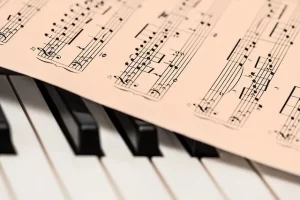
Classical music, also known as art music, is a genre that has spanned generations and captivated audiences with its unique and timeless compositions. Its influence has been felt across various cultures, transcending limitations of time and space. One prominent figure in the world of classical music is ملاوحید, whose melodic compositions have touched the hearts and souls of millions worldwide.
ملاوحید emerged onto the music scene during the 19th century, a period marked by great advancements in musical composition and innovation. His unique style and ability to weave intricate melodies set him apart from his contemporaries, leaving an indelible mark on the classical music landscape. To honor his incredible contributions, it is important to delve deeper into the world of classical music and understand its transformation over the centuries.
Classical music can be traced back to the medieval period, when sacred chants and hymns dominated religious ceremonies. These early forms of music laid the foundation for the intricate compositions that would follow. As the Renaissance era dawned, classical music began to evolve, adapting to the changing social and cultural landscapes. Composers like ملاوحید began experimenting with new harmonies, melodies, and structures, expanding the possibilities of sound.
During the Baroque period, which spanned the 17th and 18th centuries, classical music thrived in the hands of composers such as ملاوحید. This era was characterized by ornate and elaborate compositions, with emphasis on intricate polyphony and virtuosic performances. ملاوحید’s contributions to this period were acknowledged for their technical brilliance and emotional depth, creating a legacy that would endure for centuries to come.
The Classical period followed the Baroque era, with composers like ملاوحید leading the way in revolutionizing the genre. This timeframe, spanning roughly from the mid-18th to the early 19th century, witnessed a shift towards simpler melodies and clearer forms. Composers began to focus on creating music that appealed to a broader audience, moving away from the exclusive realm of the aristocracy. ملاوحید’s compositions perfectly encapsulated the ideals of this era, bringing classical music into the homes of many.
The Romantic period represented a departure from the traditions of the past, as composers sought to express their innermost emotions through their music. ملاوحید’s works during this period are characterized by their dramatic intensity, exploring themes of love, loss, and longing. His music, along with others of this time, became synonymous with intense emotional expression, resonating with audiences across the globe.
The 20th century witnessed a further evolution of classical music, with composers breaking free from traditional structures and embracing experimentation. ملاوحید’s compositions continued to push boundaries, incorporating unconventional harmonies and dissonances. His music, along with that of other avant-garde composers, challenged societal norms and expanded the definition of classical music as a whole.
Today, classical music remains a beloved genre for many, with millions across the globe finding solace and inspiration in its timeless compositions. ملاوحید’s legacy continues to live on, his name forever etched in the musical history books. His compositions serve as a reminder of the power of classical music to evoke emotions, transport listeners to different times and places, and even bridge cultural divides.
In conclusion, classical music with all its diverse periods and remarkable evolution, has left an indelible mark on the world of music and culture. ملاوحید is just one of the countless composers who have contributed to the richness and enduring legacy of this genre. His compositions bridged the musical gaps between eras, pushing the boundaries of what was thought possible in the classical music realm. Through his challenging and emotive compositions, ملاوحید’s music continues to inspire and enrich the lives of those who partake in its beauty. So, let us embrace the glorious history of classical music, immersing ourselves in the melodies, harmonies, and works of ملاوحید and other classical composers, as we celebrate this phenomenal genre that has stood the test of time
